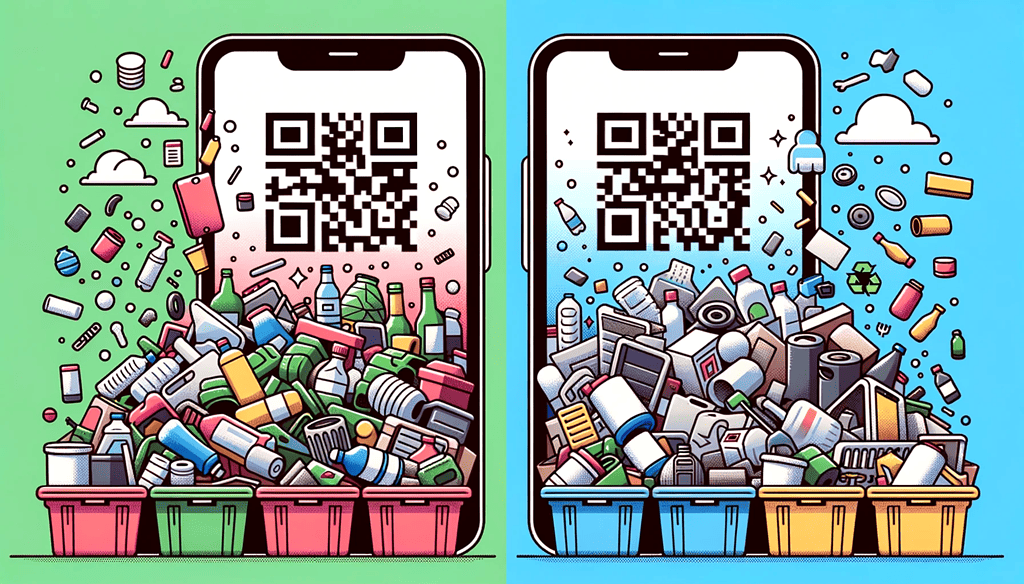
Recycling is a great idea. However, it turns out that in practice, it’s really difficult to implement. After decades of work, the recycling rate in the US has only grown to 32% — and when it comes to plastics, it’s around 5%. There are several reasons for that and one of them is that sometimes, it’s not very easy to recycle. And while some things are technically recyclable, they might not be processable in your area. Furthermore, 60% of US consumers are confused about what and how to recycle, which wastes a lot of time and resources for everyone.
But a new initiative could address at least some of that. Recycle Check, a new program run by The Recycling Partnership, is asking consumer brands to add local recycling info to their package via QR codes. Here’s why this matters.
What gets recycled
Recycling confusion is a bigger problem than you think. Many recyclables get placed in the wrong bin, where they get contaminated or soiled by dirty food. If recyclables are mixed with non-recyclable materials, or if they’re dirty or soiled, they can contaminate an entire batch of recyclables. This can render the batch unrecyclable and lead to it being sent to a landfill.
This is particularly a problem because many items (such as plastic straws, bags, and some containers) are not recyclable, although they’re made of plastic. People usually just see plastic and assume you can recycle it — not so. Furthermore, even if an item is theoretically recyclable, the actual recycling process might not occur. This can be due to limited facilities capable of recycling specific materials, causing many recyclable items to end up in landfills.
Oftentimes, this technically recyclable garbage simply ends up in landfills. Landfills are problematic as they release carbon dioxide, methane, volatile organic compounds, and other pollutants.
The challenge of recycling correctly can be daunting even for those committed to the cause. However, the introduction of the new QR code system offers some solutions. This initiative provides consumers with immediate access to relevant recycling information for their region. By simply scanning the QR code, users can discern the recyclable nature of items, thus minimizing incorrect disposals and reducing contamination risks.
The QR codes will carry dynamic, real-time information about local recycling. For instance, if one material was recycled locally until yesterday but today the facility stops working, that change will be reflected in real-time, after the code is printed. You’ll get a chance to know whether materials are genuinely recyclable or not, in your area, and what’s the best way to sort them.
Already, there are some big adopters of the labeling scheme. General Mills (who makes Cheerios, Yoplait, Betty Crocker, etc.) and Horizon Organics (which makes dairy products) have implemented the labels.
QR codes to the rescue?
This is only meant to address one part of our recycling issues. Ultimately, we still produce too much plastic and it accumulates in our oceans and landfills — so reducing how much plastic we use in the first place is still essential. Secondly, single-use and disposable plastic is still a major issue. In fact, this will likely only help consumers who are already keen on recycling, which, unfortunately, is probably still a minority.
But at least it’s something. Plus, companies are already implementing QR code labels. These QR code labels can carry much more information than the currently standard barcode, and a part of that information can be in regards to recycling.
However, while these QR codes provide valuable information, they are just a tool. The responsibility still lies with consumers to make the conscious effort to recycle correctly and with manufacturers to design more sustainable packaging. The science community can support these efforts by researching alternative materials and innovative recycling methods, ensuring that our future is not buried under mountains of waste.
The world now produces more than 380 million tonnes of plastic every year, a figure that’s steadily rising year after year. Much of this plastic ends up as a pollutant, entering our soils and oceans. Worldwide, half of the plastic we produce still ends up in landfills and some 20% of it is simply mismanaged. That leaves less than 10% of the plastic we produce globally to be recycled.
We can do better — and we must.




